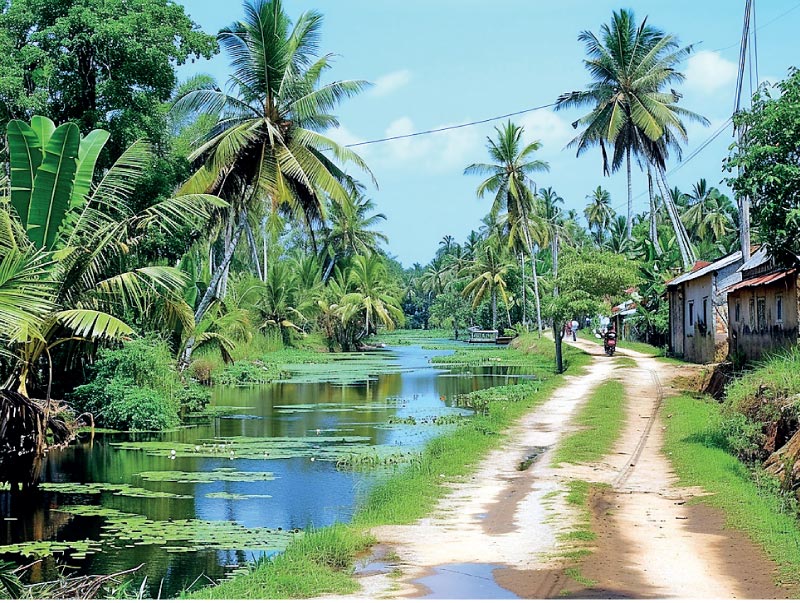Friday Feb 20, 2026
Friday Feb 20, 2026
Saturday, 27 January 2024 00:05 - - {{hitsCtrl.values.hits}}

Startups, entrepreneurs, and SMEs can play a crucial role as pioneers for a just transition towards a more sustainable, climate-friendly, and resilient economy
 The climate crisis presents a critical challenge for countries across the world. In particular, climate-vulnerable developing countries such as Sri Lanka are facing severe climate impacts as well as losses and damages, affecting all economic sectors and constraining fiscal space, development efforts, and climate action.
The climate crisis presents a critical challenge for countries across the world. In particular, climate-vulnerable developing countries such as Sri Lanka are facing severe climate impacts as well as losses and damages, affecting all economic sectors and constraining fiscal space, development efforts, and climate action.
Against this backdrop, there is a clear need for economic transformation and transition. On the one hand, existing livelihoods and business models need to adapt to climatic changes and become more resilient to shocks; on the other hand, there are also opportunities to invest in more sustainable and climate-friendly products, practices, and services across key sectors and at all levels.
Startups, entrepreneurs, and small to medium- scale enterprises can play a crucial role as pioneers and trailblazers and be at the forefront of a just transition towards building sustainable, climate-friendly, and resilient prosperity.
Climate entrepreneurship and the concept of just transition
A just transition in the context of climate action means a shift towards low-emission and climate-resilient economic growth that leaves no one behind. It entails a transition in practices and methods, but also towards different occupational profiles within certain sectors while ensuring the livelihoods, social protection, and wellbeing of communities affected by this shift.
Climate entrepreneurship can be at the heart of a just transition, as it involves empowering individuals and small businesses to make this transition and embrace innovation and green or blue growth. In Sri Lanka, the scope for such entrepreneurship spans several key sectors, including the following:
Energy and transport: Sri Lanka has a significant potential for renewable energy that reaches from solar to wind and hydropower, but also biomass, improvements in energy efficiency, and electric vehicles. Entrepreneurship in this sector can focus on any of these aspects as well as the necessary infrastructure, components, storage solutions, and assessments to contribute to energy security, job creation, and an overall reduction of the country’s carbon footprint that can work towards national climate commitments (the Nationally Determined Contributions under the Paris Agreement) or mobilise investment through carbon credits, carbon trading, or debt-for-climate swaps.
Food systems: As a central part of Sri Lanka’s economy and culture, the agriculture sector and other aspects of the country’s food system (such as fisheries, aquaculture, mariculture, home garden, agro forestry, urban agriculture, etc.) hold vast potential for entrepreneurship and a just transition that protects livelihoods, food security, and natural ecosystems. Entrepreneurship in this sector can focus, for example, on plant-based food options and alternative proteins; sustainable and climate-smart agricultural practices; digitisation and technological innovation; smart farm systems, internet of things, and artificial intelligence; waste management and storage solutions; risk management systems; and financial instruments that are tailored for food system actors along all stages of the value chain.
Tourism: Sri Lanka is endowed with a wealth of natural resources and ecosystems that can facilitate ecotourism, sustainable tourism, and other nature-based tourism enterprises that can incorporate climate action in terms of both mitigation and adaptation. Eco-tourism options that prioritise environmental conservation and benefit local communities can set a global standard for responsible travel and provide a foundation for entrepreneurship that could involve a wide variety of actors.
Fashion and textile industry: Sustainable and climate-friendly entrepreneurship in the fashion and textile sector has the potential to reduce emissions, use resources more efficiently, alleviate waste and pollution, and showcase natural or traditional solutions that are connected to local supply chains, community livelihoods, and the cultural heritage of Sri Lanka. Recycling, upcycling, using factory waste, natural dying, handloom products, natural materials, plant-based leather, and many other practices and innovations provide a rich basis for entrepreneurship in this sector.
Waste reduction and management: Efficient waste management and recycling are crucial in urban areas and for many economic sectors, including food systems and fashion. Entrepreneurial ventures in this sector can help reduce pollution and improve cost efficiency, as well as find ways to use by-products or waste to create value-added products and services.
Creating an enabling environment
For climate entrepreneurship to thrive and contribute to a just transition, it is essential to also consider the enabling environment and identify relevant policies, regulations, tax incentives, and other means of encouraging and empowering entrepreneurs towards sustainable, climate-friendly, and resilient solutions.
Beyond the policy environment, this also includes factors such as the availability of relevant certifications, standards, and accreditation opportunities; access to relevant markets and market information; specialised funds, low-interest loans, and pathways to accessing capital and investment; access to raw materials, technology, and packaging; infrastructure and facilities; education and awareness creation of entrepreneurs as well as the wider public; capacity-building and mentorship; partnerships between different actors; and overall market development when it comes to green products and consumer awareness.
However, challenges remain. The primary hurdle is the transition from traditional industries to sustainable ones without causing economic hardship and endangering existing livelihoods. Additionally, there is a need to enhance a culture of entrepreneurship and an entrepreneurial mindset in Sri Lanka and incorporate this into education and training systems while also creating opportunities for aspiring entrepreneurs to access the knowledge, training, resources, and the access they need to start and grow their business.
Entrepreneurship can play a pivotal and transformational role for transitioning towards a more sustainable, climate-friendly, and resilient economy. It is an opportunity to not only address the impacts of climate change and manage existing risks, but also to identify innovative solutions, pathways, and products that can enhance green or blue growth and connect the local to the national and global level. Fostering an enabling environment for entrepreneurship can help to operationalise synergies between climate action and economic development and facilitate a transition towards prosperity and long-term resilience for all.
(The writer works as Director: Research & Knowledge Management at SLYCAN Trust, a non-profit think tank based in Sri Lanka. His work focuses on climate change, adaptation, resilience, ecosystem conservation, just transition, human mobility, and a range of related issues. He holds a Master’s degree in Education from the University of Cologne, Germany and is a regular contributor to several international and local media outlets)